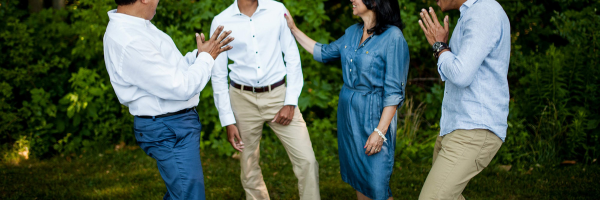September 2, 2025
Inspiring civil society in the US with a vision of a more just society

Joel Hamernick remembers sitting in a room in Chicago, listening to ASJ co-founder Carlos Hernández as he spoke about Honduras’s dramatic progress in reducing crime. Seated next to him was a friend—Chicago’s former Inspector General.
When Carlos shared that the homicide rate in Honduras had dropped to 25 per 100,000 people, the Inspector General leaned over and said, “As of this moment, Honduras is safer than Chicago.”
That single statement hit Joel hard.
For two decades, Joel and his wife had lived in the Woodlawn neighborhood on the South Side of Chicago. There, they raised their family and led Sunshine Gospel Ministries, working in youth development and community engagement. Over time, Joel began to witness firsthand the devastating impact of gun violence. Friends and neighbors lost children. Families were disrupted. The root causes—poverty, public corruption, disinvestment—begged for solutions beyond individual programs.
Joel had already been asking big questions. Why do systems fail? What allows dysfunction to persist in cities like Chicago? And what would it take to fix them? And he found part of the answer through ASJ.
Learning from Honduras
On his first visit to Honduras with ASJ, Joel was struck by our approach to justice that wasn’t about charity alone but about changing the systems that harm the vulnerable.
ASJ’s four-part methodology—Research, Collaboration, Pressure, and Advocacy—provides a roadmap for how to take on corruption and dysfunction. In Honduras, this has meant everything from land title reform to purging corrupt police officers to transforming public education.
Joel saw that ASJ wasn’t just dreaming of justice; they were implementing it at scale. He began to realize that systemic reform, rather than just neighborhood-based programming, could unlock opportunity for whole populations. ASJ’s success gave him hope that a similar strategy could work back home.
Building A More Just Chicago
In early 2025, Joel launched A More Just Chicago—an initiative aimed at confronting Chicago’s most entrenched problems by applying lessons from ASJ and elsewhere.
A More Just Chicago’s first tangible project has been developing a city charter to rebuild the city’s governing foundation, powers, and responsibilities. Among the 15 largest cities in the US, Chicago is the only one without a charter. As a result, Chicago has struggled under the weight of corruption, financial mismanagement, and ineffective governance.
“We’ve got world-class institutions—science, medicine, AI—right alongside communities suffering from chronic disinvestment,” Joel explained. “Our schools are underfunded. Our transit system is failing. And 40% of the city’s budget is consumed by debt and pension obligations. This is a systems problem. And systems problems require systemic solutions.”
The idea for A More Just Chicago is not just to draft a new charter behind closed doors. It’s to involve communities—all of them—in shaping the future of their city.
A Citywide Alliance
Mirroring ASJ’s collaborative approach, Joel and his team are building an alliance that spans the city’s racial, economic, and faith divides. Their board already includes high-profile figures: a leader from Chicago Public Schools, business and faith leaders—including Christians, Jews, and the same former Inspector General who was with Joel when he first heard about ASJ.
But it’s the grassroots strategy that sets this work apart. They plan to recruit 2–3 charter ambassadors in each of Chicago’s 77 neighborhoods—trusted community members who will host dinners and dialogues about what people want from their city’s government. These dinners are not policy briefings. They’re opportunities for residents to ask: If you could change something about Chicago, what would it be?
Answers will be collected and sent to policy and legal experts, who will evaluate which ideas might be included in the new charter and how they would work in practice. Just like ASJ’s model, this process begins with listening and research, builds through collaboration, and will eventually lead to strategic pressure and advocacy—through public messaging, media, and policy action.
“This isn’t about politics,” Joel says. “It’s about governance. It’s about building a system where corruption isn’t so easy, where public resources actually serve the public.”
A Global Vision, A Local Example
At ASJ, we often talk about our dream of a more just society—spanning from Honduras to other parts of our world. For years, we’ve hoped that the model being refined in Honduras could spark justice movements elsewhere. Joel’s work is one of the clearest examples yet of that dream becoming reality.
Joel is quick to say that A More Just Chicago isn’t a copy-and-paste of ASJ. The challenges in the U.S. are different in many ways. But the core idea—that justice can be pursued through faithful, strategic, civic action—is the same.
This is what it looks like to take a vision to other parts of our world: not by exporting programs, but by inspiring local leaders to show bravery in their own context.
Chicago faces enormous challenges. But it also holds tremendous promise. If a diverse, citywide alliance can come together to create structural change—starting with a new charter—then Chicago will have a new opportunity to become more just.


















